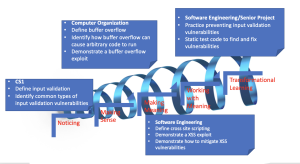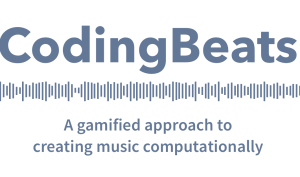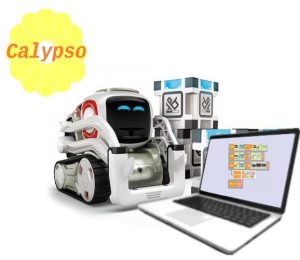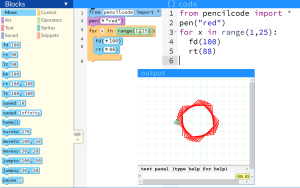Current Projects
 AI for K-12 Initiative
AI for K-12 Initiative
Christina Gardner-McCune is Co-Chair of the AI for K-12 Initiative Steering Committee.
Website: AI4K12.org
In May 2018, the Association for the Advancement of Artificial Intelligence (AAAI) and the Computer Science Teachers Association (CSTA) formed a joint working group to develop national guidelines for teaching K-12 students about artificial intelligence [1]. Inspired by CSTA’s national standards for K-12 computing education [2], the AI for K-12 guidelines will define what students in each grade band should know about artificial intelligence, machine learning, and robotics. The working group is also creating an online resource directory where teachers can find AI-related videos, demo software, and activity descriptions they can incorporate into their lesson plans.

AI4GA: Artificial Intelligence for Georgia
Project Lead: Christina Gardner-McCune
Project Team:
Website: AI4GA.org
This is a new project we are focused on three main goals, development of
- AI & ML demos – AI For Kids
- An AI summer camp for high school students (Now in Development Summer 2021)

CASMM: Computational Thinking and Science, Making, & Modeling
PI: Dr. Sharon Chu
Co-PI: Dr. Christina Gardner-McCune
Past Project Lead: David Magda, Abhishek Kulkarni (ELX lab)
Past Project Team: Yerika Jimenez,Megha Nagarmunoli
Live CASMM Programming Environment
This project investigates an approach to teach formal science that allows students to simultaneously learn technology skills and knowledge (Making and computational skills and thinking). The approach involves students engaging in Science Modeling through Physical Computing (SMPC) to build science models to learn both science and computing in grade 5-6 classes. This project supports student learning through the design and development of a web-based programming environment and learning management system that features easy to use block-based programming for Arduino and tools for developing and organzing programming activities for the classroom.

CS Professional Identity Development
Project Lead: Amanpreet Kapoor
This project aims to understand how CS undergraduate students are forming their professional identity and the role played by CS degree programs and various avenues for informal learning in supporting CS students’ professional development. The project assesses the professional development of CS students by gauging students’ technical competency and confidence gained through their degree experiences, professional experiences, various CS communities of practices, independent skill development, and social supports.
Dual-Modality Instruction
Project Lead: Jeremiah Blanchard
We are studying how learning of programming languages connects with construct representation in text and blocks. This project focuses on Pencil Code, a web-based dual-modality programming environment, and Amphibian, a plugin for IntelliJ IDEA, both of which are built on the Droplet editor. We are working on this project with Dr. Lisa Anthony and the INIT Laboratory.
Compile-And-Run Prompts in Digital Programming Assessments
Project Lead: Jeremiah Blanchard
This project aims to understand how students perceive different types of programming assessment questions. The focus is on comparing pseudocode essay exams with compile-and-run environment exams and exploring students’ feelings and performance on the different types of programming assessments.
 Cybersecurity Across the Curriculum
Cybersecurity Across the Curriculum
Project Lead: Cheryl Resch
This examines the effect of providing cybersecurity lessons throughout the CS curriculum on students’ attitude toward the importance of maintaining good cybersecurity hygiene
Past Projects

VR Empathy Development in young children
Project Lead: Ekaterina Muravevskaia
This project explores the use of VR to promote empathy development in young children (age 5-8). This project aims to empirically study the affordances of VR and Fairytales to promote cognitive empathy development through the development and use of the Virtual Reality (VR) educational game “Why Did Baba Yaga Take My Brother?”

Black Boy Joy
Project Lead: Joseph Isaac
This project investigates effective pedagogies to increase the interest and persistence of black middle school boys in computer science (CS) in the United States. It will identify significant factors for low interest and low persistence of black boys in computer science through existing literature, examine effective strategies for black boys participating in computer science, and conduct experiments to measure the effectiveness of strategies and pedagogies for increasing the participation of black boys in computer science.

Supporting K-12 AI Learning: Tools, Resources, & Curriculum
Project Lead: Christina Gardner-McCune
Project Team: Amal Hashky, Teresa Ferguson, Disha Nayar, Krutantak Patil
NOW Available: Opportunities for software developers and undergraduate research assistants
This is a new project we are focused on three main goals, development of
- AI & ML demos – AI For Kids
- An AI summer camp for high school students (Now in Development Summer 2021)
- Studying how students develop AI competencies and skills

CodingBeats
Project Lead: Joseph Isaac
This project explores new ways to teach computer programming concepts (sequences, loops, parallelization, booleans, etc.) to middle and high school students using their own knowledge and interests in music production and solving puzzles.

Understanding students’ Mental Effort Block-based Programming environments using Electroencephalography (EEG)
Project Lead: Yerika Jimenez
The goal of this project is to leverage advances in Electroencephalography (EEG) research to explore how students learn CS concepts, write programs, and complete programming tasks in block-based programming.

Kodu: Teaching Elementary School Students to Reason about Code
UF Project Lead: Christina Gardner-McCune
Past UF Project Lead: Ashish Aggarwal
This project designed curriculum, pedagogy, and assessment to teach 3-5th grade students how to reason about programs using the Laws of Kodu Computation. We found that explicitly teaching students
how Kodu rules are interpreted significantly improved their ability to understand the execution of programs and to explain program behavior. The results of this research provide insight into how elementary school students reason about simple programs, and how this ability can be scaffolded.

Calypso for Cozmo
UF Project Lead: Christina Gardner-McCune
This project teaches students in grades 3-8 about robotic artificial intelligence and reasoning about programs through programming the Anki Cozmo robot with Calypso rule-based programming environment. Through this project, we are developing curriculum, implementing curriculum in classrooms, and conducting teacher professional development.


